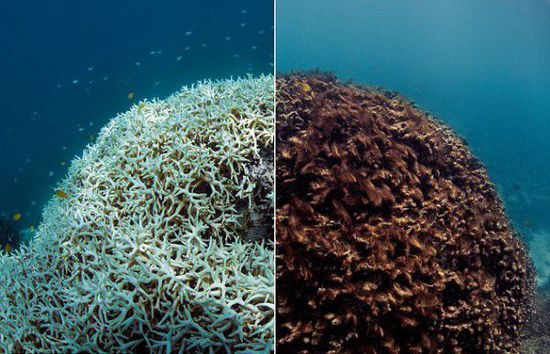(单词翻译:单击)
听力文本
This is Scientific American — 60-Second Science. I’m Jason Goldman.
Got a minute?
In April the world learned that more than 90 percent of Australia's Great Barrier Reef had become bleached. That is, warming waters or other conditions cause the algae living in the coral to exit, leaving the coral weak. It's a bleak statistic, because it's reasonable to assume that as the corals themselves suffer, the entire ecosystem they support suffers as well.
For example, a study finds that bleaching hinders fish from learning to avoid predators.
Imagine you're a fish, and suddenly one of your friends meets its unfortunate end in the jaws of a predator.
"We found that these animals actually have this really sophisticated way of learning, which involves the linking of chemical alarm cues, which are damage-released cues from conspecifics, and any other smell or even the sight of anything novel... sort of a Pavlov's dog-type scenario."
James Cook University marine scientist Mark McCormick. He and his team found that this learning process breaks down when the coral becomes bleached. Instead of hosting algae within, the bleached coral becomes blanketed by algae.

"We've used little patches of live coral and little patches of dead and degrading coral, which have similar topographic complexity, and what we've done is we put those little patches within a bed of either live coral or dead and degraded coral."
Onto each patch, the researchers deposited a small, naive reef dweller called a damselfish. They wanted to see how the health of the reef influenced the fish’s ability to learn to avoid the odor of a predator called the dusky dottyback. And they found that the presence of degraded coral—even if surrounded by a healthy reef—entirely disrupted that learning mechanism.
"It touches on a really big issue, to some extent a really global issue. So, even though this is actually dealing with a relatively small aquarium fish, it's got life history traits that are very similar to virtually all of the other marine organisms."
So, is there anything that can be done to help the world's reefs and their inhabitants?
"These communities are going to have to try and rebuild, and they have really effective mechanisms whereby they can re-seed themselves. But we're talking about timescales of really probably 10-15 years to actually get a healthy reef back after really a cataclysmic change."
And for that to happen, McCormick says, we need to reduce our CO2 emissions and to stop polluting our waterways. In order for things to improve underwater down under.
Thanks for a minute for Scientific American — 60-Second Science. I’m Jason Goldman.
参考译文
这里是科学美国人——60秒科学。我是杰森·高曼。
有一分钟时间吗?
今年4月,全世界知道了澳大利亚大堡礁有超过90%的珊瑚出现漂白现象的消息。这是由于温暖的海水和其他条件导致珊瑚排出了共生的藻类,这使珊瑚变得虚弱。这一数字并不乐观,因为我们有理由认为在珊瑚本身遭受破坏的同时,支持珊瑚的整个生态系统同样遭到了破坏。
举例来说,一项研究发现,漂白现象对鱼类学习躲避捕食者造成了阻碍。
想象一下,假如你是一只鱼,突然你的一个同伴遭遇不幸,命丧捕食者口中。
“我们发现,这些动物的学习方式非常复杂,学习过程包括与化学物质相关的警报提示,即同种生物传递出的危险信号和味道,甚至是不同寻常的景象,就像巴甫洛夫的狗这种理论。”
这是詹姆斯·库克大学的海洋科学家马克·麦考密克所说。他和他的团队发现,在珊瑚漂白化以后,这种学习过程就被破坏了。藻类不再生活在珊瑚体内,而是会覆盖住珊瑚。
“我们用小块活珊瑚和死后降解的珊瑚进行了实验,它们拥有类似的地形复杂性,我们把这些小块珊瑚放在有活珊瑚或死后降解珊瑚的海底。”
研究人员在每块珊瑚上放了一个小“礁民”——雀鲷。他们想知道珊瑚礁的健康如何影响鱼类学习躲避捕食者气味的能力。他们发现,降解珊瑚即使处在健康的珊瑚礁中,也会彻底破坏鱼类的学习机制。
“这涉及一个非常重要的问题,从某种程度上可以说是全球问题。虽然这只是用相对较小的水族观赏鱼进行的实验,但是实验得出的生活史特征和所有其他海洋生物类似。”
有没有什么方法能帮助世界上的珊瑚礁和栖息于珊瑚礁的生物?
“这一群体需要重建,它们拥有可以自我修复的高效机制。但是在灾难性变化之后,这些珊瑚恐怕需要10年至15年的时间才能恢复正常。”
麦考密克表示,为了让珊瑚恢复健康,我们要减少二氧化碳排放量,停止污染水域的行为。这样才能保证海底的情况得到改善。
谢谢大家收听科学美国人——60秒科学。我是杰森·高曼。
译文为可可英语翻译,未经授权请勿转载!
重点讲解
重点讲解:
1. break down 出毛病,损坏;
例句:Her health broke down under the pressure of work.
工作的压力把她的身体弄垮了。
2. touch on 谈及;涉及;
例句:The book does not touch on this question.
这个问题书里面没涉及到。
3. to some extent 在某种程度上;
例句:To some extent I hold that opinion of them still.
在某种程度上,我仍对他们持同样的看法。
4. be similar to 相像的;相仿的;类似的;
例句:His stance towards the story is quite similar to ours.
他对该报道的态度和我们很相像。


